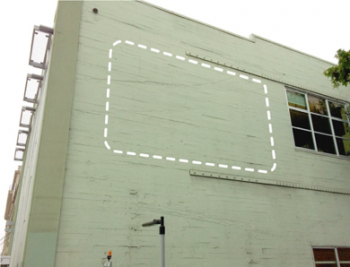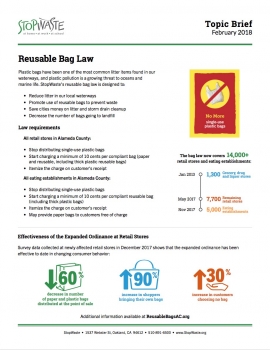Resource Library
- Brochures
 Topic Briefs
Topic Briefs- Policies, Brochures, Kits
The Water Efficient Landscape Ordinance is a statewide water conservation law for new and renovated landscapes that meet a certain size threshold.
StopWaste has developed a WELO Tool Kit to help its member agencies implement the ordinance. The Tool Kit consists of model checklists, a water budget/water use calculator, and a permit counter brochure.
Public agencies can use these materials as is or modify them to meet local requirements.
Read More  Topic Briefs
Topic BriefsSince 1996, StopWaste has provided more than $8 million in funding to local organizations for innovative projects that decrease the amount of waste generated and sent to the county's landfills, and encourage the development, marketing and use of recycled products. The grants program is currently focused on funding waste prevention, reuse and repair projects.
Read More
StopWaste is soliciting designs for a mural to be commissioned for the side of our building at 1537 Webster Street in Oakland. Four finalists will be selected from among the submissions received, and each finalist will receive $500 to develop their concept for the final round. After the winning concept is selected, the chosen artist will receive up to $13,000 to finalize their conce
Read More News | 03/09/2018
News | 03/09/2018In January, 28 public agency staff in Alameda County earned the Bay-Friendly Landscape Professional credential.
Read More Topic Briefs
Topic Briefs News | 02/14/2018
News | 02/14/2018StopWaste Executive Director Wendy Sommer will be inducted into the Alameda County Women’s Hall of Fame in the category of the Environment at its 25th Anniversary Luncheon and Awards Ceremony on March 24 in Oakland.
Read More- News | 01/30/2018
Livermore and Oakland schools will be able to make a bigger dent in tackling food waste after being awarded a $500,000 CalRecycle Food Waste Prevention and Rescue Grant. Project partners also include ALL IN Alameda County and StopWaste.
The awarded Smart Cafeteria Initiative will utilize and expand upon food share tables in every school cafeteria across two school districts to capture and sort unwanted food from lunch that is generated during or after meal service. Surplus food will be available for hungry students to consume at school, then to families from the school community.
Read More